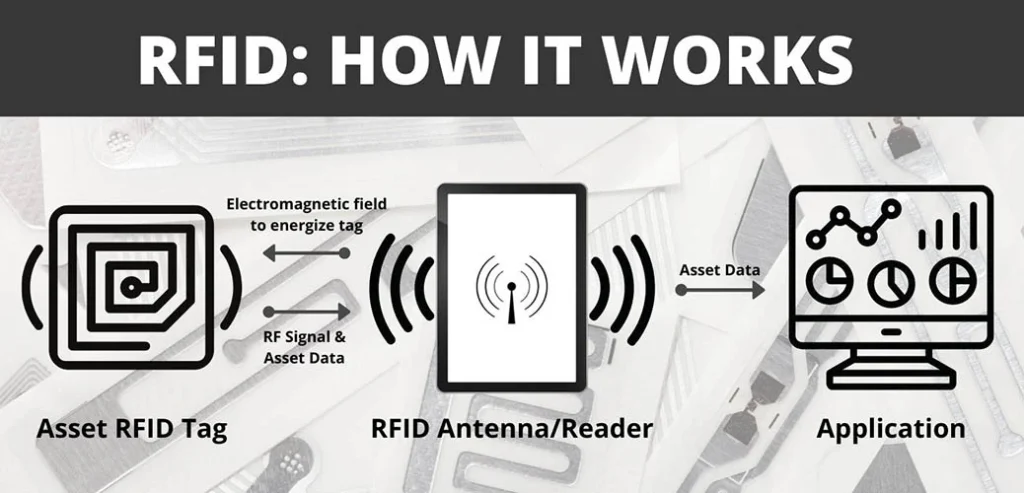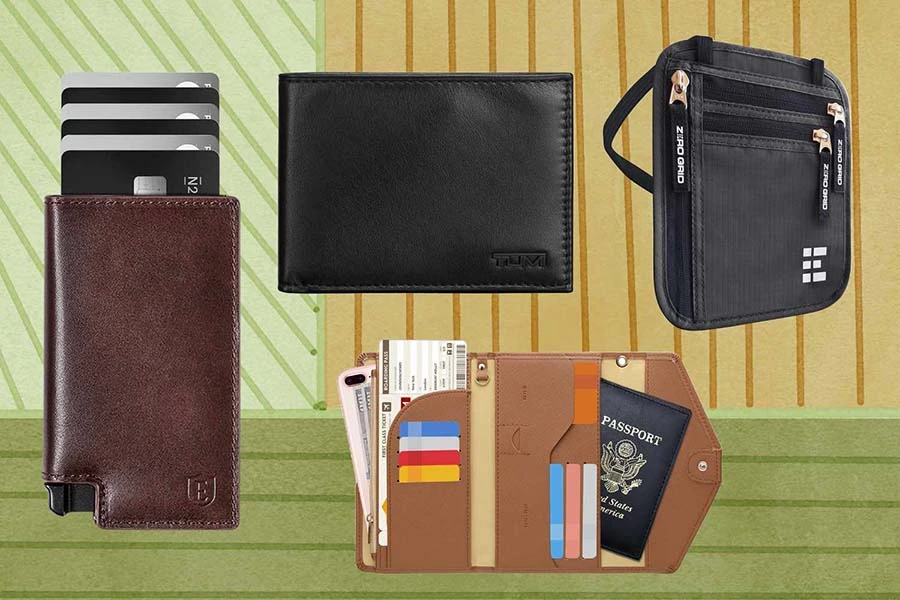RFID (Radio Frequency Identification) technology has become increasingly prevalent in various industries, offering convenience and efficiency. However, concerns about RFID security have emerged, raising questions about the effectiveness of different methods to protect sensitive information. In this article, we delve into the topic of whether aluminium foil can effectively block RFID signals and explore alternative solutions for RFID security.

Everything About RFID:
RFID Technology:
RFID systems consist of its tags and readers. Tags are small electronic devices that store and transmit data using radio waves, while readers are devices that capture and interpret the information stored in the tags. This technology enables seamless communication and data exchange in various applications, such as inventory management, access control, and contactless payments.
How It Works:
RFID tags and readers communicate through radio waves. When a reader emits a radio signal, its tag within range captures the signal’s energy and uses it to power up. The tag then responds by transmitting its stored information back to the reader, allowing for data retrieval and interaction between the two devices.

RFID Security Concerns:
The widespread adoption of its technology has raised concerns about unauthorized access to sensitive information. With the ability to read RFID tags remotely, malicious individuals could potentially intercept personal data or gain unauthorized access to secure areas. Safeguarding its systems is crucial to protect privacy and prevent potential security breaches.
Does Aluminium Foil Blocking RFID?
Many individuals believe that aluminium foil sheet can effectively block RFID signals, acting as a protective shield against unauthorized scanning. This belief stems from aluminum foil’s ability to block electromagnetic radiation in other contexts, such as in shielding against radio waves and blocking signals in electronic devices.

While aluminum foil does possess electromagnetic shielding properties, the effectiveness of its RFID-blocking capabilities is subject to scrutiny. The specific characteristics of RFID systems and the frequencies they operate on play a significant role in determining the effectiveness of any blocking material.
Many scientific studies and experiments have demonstrated that aluminum foil’s ability to block RFID signals is limited. The thickness and quality of the foil, as well as the distance between the RFID tag and the foil, can impact its effectiveness. Additionally, the presence of surrounding objects and interference can further diminish its blocking capabilities.
RFID Frequencies And Shielding:
RFID systems operate on various frequency bands, including low frequency (LF), high frequency (HF), and ultra-high frequency (UHF). Each frequency band has unique characteristics and applications. The frequency at which an RFID system operates can influence the effectiveness of any blocking material, including aluminum foil paper.
Aluminum foil’s ability to block RFID signals varies depending on the frequency used by the RFID system. Lower frequency bands generally penetrate materials more effectively, making it more challenging for aluminum foil sheet to provide sufficient blocking. Higher frequency bands, on the other hand, may be more susceptible to interference from aluminum foil.
While aluminum foil can attenuate radio waves to some extent, its effectiveness in blocking RFID signals is inconsistent. The aluminum foil material’s thickness, quality, and ability to create a complete and uninterrupted barrier are crucial factors in determining its blocking capabilities.
Factors Affecting RFID Blocking:
Thickness and Quality of Aluminum Foil
Thicker and higher-quality aluminum foil sheet may provide better blocking capabilities compared to thin or low-quality alternatives. A more substantial foil can attenuate radio waves and potentially limit the range at which RFID signals can be intercepted.
Distance Between the RFID Tag and Aluminum Foil
The proximity between the RFID tag and the aluminum foil sheet significantly affects the effectiveness of blocking. The closer the tag is to the foil, the more likely it is that the foil will interfere with the signal transmission. However, at greater distances, the blocking capabilities diminish.
Interference from Surrounding Objects
The presence of other objects near the aluminum foil sheet can impact its RFID-blocking effectiveness. Objects composed of conductive or reflective materials may reflect or redirect RFID signals, altering the degree of interference caused by the foil.
Scientific Studies and Experiments:
Various scientific studies have examined the capabilities of aluminum foil paper as an RFID blocker. These studies have tested different foil thicknesses, evaluated signal attenuation, and explored the impact of foil on RFID range and readability.
Research findings suggest that while aluminum foil can attenuate RFID signals, its effectiveness as a reliable and consistent blocking material is limited. Factors such as foil thickness, RFID frequency, and proximity between the foil and the tag all influence the degree of blocking achieved C.
It is important to acknowledge the limitations of the existing research on aluminum foil as an RFID blocker. The studies conducted so far have focused on specific scenarios and may not fully capture all real-world conditions. Further research is needed to provide comprehensive insights into the effectiveness of aluminum foil paper as an RFID-blocking material.
Alternative RFID Blocking Methods:
A. Introduction to Specialized RFID-Blocking Materials
While aluminum foil paper may not be the most effective option for RFID blocking, there are specialized materials designed specifically for this purpose. These materials incorporate advanced technologies and features to provide enhanced RFID protection.
B. Overview of RFID-Blocking Wallets and Sleeves
RFID-blocking wallets and sleeves are popular options for protecting personal information stored on RFID-enabled cards, such as credit cards and passports. These products typically feature layers of specialized materials that create a barrier against RFID signals, preventing unauthorized scanning.

C. Evaluation of Effectiveness Compared to Aluminum Foil
RFID-blocking wallets and sleeves have been extensively tested and proven to provide reliable protection against RFID scanning. They are designed to meet specific standards and provide consistent blocking capabilities, surpassing the limitations of aluminum foil paper.
Best Practices for RFID Security:
To ensure the security of personal information and prevent potential RFID-related threats, it is vital to develop an understanding of the risks associated with RFID technology. This knowledge empowers individuals to make informed decisions and take appropriate measures to protect their privacy.
Use of Secure RFID-Blocking Products
Opting for specialized RFID-blocking products, such as wallets and sleeves, is a recommended approach to safeguarding sensitive information. These products offer a reliable means of protecting RFID-enabled cards from unauthorized scanning, providing peace of mind in various scenarios.
Additional Measures for Protecting Personal Information
In addition to using RFID-blocking products, there are other measures individuals can take to enhance RFID security. These include being mindful of the information shared and stored on RFID-enabled devices, regularly monitoring financial transactions, and keeping up with the latest advancements in RFID security.
Can Aluminum Foil Effectively Block RFID Signals?
Through a comprehensive analysis of aluminum foil sheet characteristics and scientific research results, it can be seen that the RFID shielding ability of aluminum foil is limited and inconsistent.
In conclusion, the belief that aluminum foil sheet can effectively block RFID signals is a myth that does not hold up to scientific scrutiny. While aluminum foil possesses electromagnetic shielding properties, its ability to consistently block RFID signals is limited. Specialized RFID-blocking products, such as wallets and sleeves, provide more reliable and effective protection against unauthorized scanning. By understanding RFID technology, its security concerns, and the available solutions, individuals can make informed decisions to safeguard their personal information in an increasingly connected world. Stay informed, adopt appropriate measures, and prioritize RFID security to protect your privacy and maintain peace of mind.


